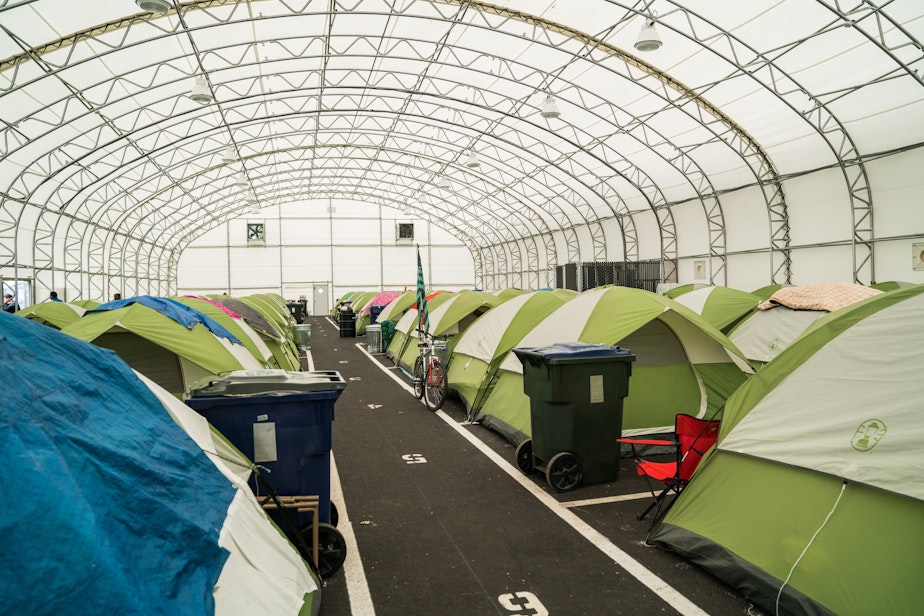What if we treated homelessness like an earthquake?

Everyone agrees that homelessness is a crisis in Seattle, but there are differing views about who is being impacted and what should be done. In public forums, homeless service organizations regularly butt heads over these ideas with frustrated homeowners.
But what about doctors?
Some members of the medical community, like the University of Washington School of Public Health's Dr. Bill Daniell, have their own take.
Daniell, a member of the King County Board of Health, sees the issue in stark, clinical terms: The number of people living unsheltered on the streets is a public health disaster with high stakes – in some cases life or death.
A recent report from the King County Medical Examiner shows that nearly 700 people without homes have died between 2012 to 2017. Half of them died outside.
Sponsored
Last year, King County hit a fatal record with 169 deaths investigated by the Medical Examiner’s office.
As winters and flu season roll back around, Daniell wants to see urgent action taken. He authored a petition with two other members of the King County Board of Health calling for political leaders to recognize homelessness as a public health disaster.
Daniell and his co-authors want to see enough large-scale shelter infrastructure for everyone who is unsheltered by fall or winter. And they want that shelter to come with supportive services.
The petition has more than 400 signatures.
“Although this doesn’t fit with people’s idea of an acute event – like a hurricane, or a tornado, or a tsunami, or a volcanic eruption – it definitely has a chronically displaced population that’s not having needs fulfilled for basic existence and social support,” Daniell said.
Sponsored
Local governments have already thought about what they’d do if thousands of people were suddenly displaced by something lika an earthquake, Daniell added, so they can use the same logic. Of course, unlike an earthquake, the rising number of people who are homeless and unsheltered is unlikely to unlock federal funds.
The petition has since been adapted into a set of draft guidelines that will be revised and voted on by the Board of Health as early as next month.
But Daniell and his colleagues aren’t the first to consider this kind of approach.
The City of Tacoma declared a state of public health emergency in May last year in response to conditions in unauthorized homeless encampments. The city then set up a huge shelter in an industrial area of the city with 60 tents inside and 20 smaller shelters surrounding it. The site has 24/7 staffing and services, as well as AC in the summer and heat in the winter.
Erica Azcueta with the City of Tacoma said it's called a "mega tent."
Sponsored
“I think it’s had a really great impact for us,” Azcueta said. “[People] have a safe place to go, they get three meals every single day, they can get clean, they just have the amenities and human basic rights they didn’t have before,” she said of the site’s residents.
About 80 to 90 people live there at any time. The site costs about $3 million per year and has served nearly 200 people since it opened last June. In just over a year, 137 people have left the site.
Of those, 42 have gone into permanent housing. The other 95 have gone back to the streets, or sometimes to jail or treatment, Azcueta said.
The large shelter hasn’t solved all of Tacoma’s problems. And those problems weren’t at the same scale as Seattle and King County. At last count there were more than 500 people homeless on any given night in Tacoma, 173 living unsheltered. On any given night in King County, there are more than 12,000 people homeless. More than half – 6,320 – are considered unsheltered, sleeping on the streets, in vehicles and in tents.
Some local businesses also have issues with the mega tent, saying they’ve seen negative impacts since it was set up, like increased trash, trespassing and attempted theft.
Sponsored
But Azcueta said the site has intense services and has allowed service providers to work together to help the residents.
In King County, some people want more focus on long term solutions like housing, instead of short term fixes like shelter.
King County Councilmember and chair of the Board of Health Rod Dembowski said he doesn’t think large tents are the way to go. But he does think more shelter is needed.
“I come down on the side of, 'Get folks sheltered so they do not die,'" Dembowski said. "There is no individual to house when she’s dead."
